January 10, 2012
Edited by David Sanders
Specimen Days
January 18, 2012
1803 – Ippolit Bogdanovich, Russian poet (b. 1743), dies.
1835 – Jan van Droogenbroeck, Flemish poet, is born.
1840 – Austin Dobson, England, poet/critic/biographer, is born.
1867 – Rubén Darío, Nicaraguan Journalist, Diplomat, Poet (d. 1916), is born.
1896 – Hans H Holm, Norwegian poet (Jonsoknatt), is born.
1935 – Jon Stallworthy, English poet, is born.
1940 – Kazimierz P Tetmajer, Polish writer/poet (Young Poland), dies at 74.
2006 – Jan Twardowski, Polish poet (b. 1915), dies.
2009 – Grigore Vieru, Romanian poet (b. 1935), dies.
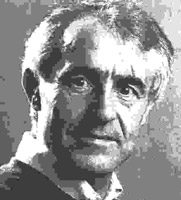 And what did I know, except
And what did I know, except
that you, the better part of me,
did not exist? But I have kept
your anniversary
today – or, there, tonight –
returning to the creek, and trying
to understand. I saw the light
falling, falling, and the rainbow flying.
—Jon Stallworthy (from “At Half-Past Three in the Afternoon”)
Poetry In The News
Mystery of Victorian-era Poet’s Illness Deciphered after 150 Years
 Known for her poetry, letters, love affair and marriage to Robert Browning, Elizabeth Barrett Browning also left a legacy of unanswered questions about her lifelong chronic illness. Now, a Penn State anthropologist, with the aid of her daughter, may have unraveled the mystery. Born in 1806, Barrett Browning suffered throughout her life from incapacitating weakness, heart palpitations, intense response to heat and cold, intense response to illnesses as mild as a cold, and general exhaustion in bouts that lasted from days to months or years. Her doctors were unable to diagnose or treat her illness, which apparently first appeared around age 13. Read more at Penn State Live.
Known for her poetry, letters, love affair and marriage to Robert Browning, Elizabeth Barrett Browning also left a legacy of unanswered questions about her lifelong chronic illness. Now, a Penn State anthropologist, with the aid of her daughter, may have unraveled the mystery. Born in 1806, Barrett Browning suffered throughout her life from incapacitating weakness, heart palpitations, intense response to heat and cold, intense response to illnesses as mild as a cold, and general exhaustion in bouts that lasted from days to months or years. Her doctors were unable to diagnose or treat her illness, which apparently first appeared around age 13. Read more at Penn State Live.
Poet Frost’s Home Illegally Converted to Apartments
Authorities report that the late poet Robert Frost’s home in this historic mill city is being used by a church group for illegal apartments. City Inspector Gregory Arvanitis said he discovered four apartments in the Frost homestead had no electrical, plumbing or gas permits and inadequate exit. He said the home, highlighted on the Robert Frost Walking Trail, is owned by the Anchor Baptist Church of Woburn, Mass. Read more at Journal Express.
Bromsgrove-born Poet Receives Knighthood
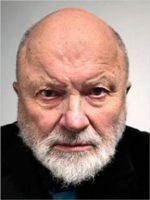 A Bromsgrove born poet has received a knighthood in the New Year Honours.
A Bromsgrove born poet has received a knighthood in the New Year Honours.
Geoffrey Hill, 79, is well regarded in the world of poetry and has won a plethora of literary prizes. Last year he was elected Oxford’s Professor of Poetry, after winning a vote by an overwhelming margin among Oxford graduates. Professor Hill was born in Bromsgrove and brought up in Fairfield where his father was a village policeman. Read more at the Bromsgrove Advertiser.
Sonia Sanchez Becomes Philly’s First Poet Laureate
Mayor Michael Nutter and the City of Philadelphia are embracing poetry as a powerful means of communication and artistic expression by creating a citywide position for poet laureate. And West Philadelphia resident Sonia Sanchez will be the first artist named to the post. According to this article from the Associated Press, the activist and poet was appointed to the newly created position Thursday. Mayor Nutter called Sanchez “the longtime conscience of the city.” Read more at Philly Burbs.
World Poetry
Ezra Pound’s Daughter Takes on Italian Fascist Group CasaPound
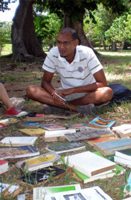 The saddest thing was seeing how they took Mario Castillo away in handcuffs. But then again, it was also the most beautiful: seeing the firm look on his face, with no hatred for those men who couldn’t understand. On Friday 17 people read poetry in a bar on a corner of Old Havana. It’s one of those poor bars that don’t show up in the “Rutas y Andares” (Routes and Walks) issued by the City Historian’s Office. The reading was sponsored by Critical Observatory in a salute to the Poetry Without End Festival – and it was beautiful. Mario improvised some moving verses to the sound of a reggaeton rap and a libertarian spirit. Daisy read “El burocrata” by Roque Dalton, and Marfrey brought his own poems, which shocked everyone. Read more at the Havana Times.
The saddest thing was seeing how they took Mario Castillo away in handcuffs. But then again, it was also the most beautiful: seeing the firm look on his face, with no hatred for those men who couldn’t understand. On Friday 17 people read poetry in a bar on a corner of Old Havana. It’s one of those poor bars that don’t show up in the “Rutas y Andares” (Routes and Walks) issued by the City Historian’s Office. The reading was sponsored by Critical Observatory in a salute to the Poetry Without End Festival – and it was beautiful. Mario improvised some moving verses to the sound of a reggaeton rap and a libertarian spirit. Daisy read “El burocrata” by Roque Dalton, and Marfrey brought his own poems, which shocked everyone. Read more at the Havana Times.
Working through Grief with Tanka Poems
When a family member is diagnosed with a life-threatening disease, should relatives put on a brave face in the hope of sparing their loved one further anxiety, or should they openly grieve together? There is no easy answer for people faced with such a difficult situation. Kazuhiro Nagata, 64, is a writer of somonka love poems, which consist of two tanka poems–one an expression of love, and the second a response by another person. He lost his wife, Yuko Kawano, also a poet, in August 2010 to breast cancer. She was 64. Read more at the Daily Yomiuri.
New Books
NITRO NIGHTS by W.S. Di Piero
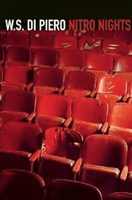 [Paperback] Copper Canyon Press, 96 pp., $15.00
[Paperback] Copper Canyon Press, 96 pp., $15.00
W.S. Di Piero marries a streetwise, working-class sensibility to an intellectual rigor and precise language in poems that stare down depression, failed love, and urban nightlife. In a fast-paced, half-cracked/half-sane style reminiscent of bebop solos, Di Piero forges masterful poems that “keep it close, loose, and sweaty,” and restore life’s intensity while showing where real hope might be found.
BLOOD PRISM by Edward Haworth Hoeppner
[Paperback] Ohio State University Press, 88 pp., $14.95
The poems in Blood Prism span a lifetime. Its three sections, “Memory,” “Politics,” and “Age,” frame meditations on a violence-blotched world with reflections on the author’s childhood and conclusions about a decades-long life of writing. “I’m 60 and still . . . alive in this world, with love and with its palindrome,” one poem says. And the argument of the book turns on that precise puzzle: on evol, invoking as it does both evil and evolve, both human wrong and life as something more than mere survival. In a variety of styles—prose poems, standard and dislocated forms—Hoeppner uses “blood” to represent family and history, his surprising and richly imagistic language rendering the emptiness he calls imagination “into remains. Into what persists.”
CITIZEN by Aaron Shurin
 [Paperback] City Lights Publishers, 88 pp., $10.95
[Paperback] City Lights Publishers, 88 pp., $10.95
Widely acclaimed for his lyrical language and innovative verse, Aaron Shurin brings the prose poem into new richness and complexity in Citizen. Through shape-shifting sentences and sensuous imagery he explores the nuances of civic and domestic life, the twists and turns of desire, and the mysterious shimmer of objects. Traveling across the borders of cities and the boundaries of form, he crafts a dazzling vision of daily life as a citizen of the imagination.
HEAVENLY BODIES by Cynthia Huntington
[Paperback] Southern Illinois University Press, 88 pp., $15.95
In this blistering collection of lyric poems, Cynthia Huntington gives an intimate view of the sexual revolution and rebellion in a time before the rise of feminism. Heavenly Bodies is a testament to the duality of sex, the twin seductiveness and horror of drug addiction, and the social, political, and personal dramas of America in the 1960s. From the sweetness of purloined blackberries to the bitter taste of pills, the ginger perfume of the Hawaiian Islands to the scream of the winter wind, Huntington’s fearless and candid poems offer a feast for the senses that is at once mystical and earthy, cynical and surreal. Echoing throughout are some of the most famous—and infamous—voices of the times: Joan Baez and Charles Manson, Frank Zappa and Betty Friedan. Jinns and aliens beckon while cities burn and revolutionaries thunder for change. At the center is the semiautobiographical Suzy Creamcheese, sensual and rebellious, both almighty and powerless in her sexuality. Achingly tender yet brutally honest, Heavenly Bodies is an unflinching reflection on the most personal of physical and emotional journeys.
Recent Reviews
Once: The Long Goodbye
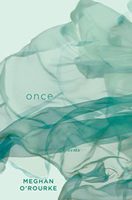 by Michael Lindgren
by Michael Lindgren
Like their creator, the poems in this arresting meditation on loss bring to mind some highly evolved form of modernist design: sleek, elegant, and chilly to the touch. Brooklynite high flier Meghan O’Rourke occasionally skirts the banal and derivative, but most of the poems in Once land on the ear and the mind with startling freshness and force. In April, O’Rourke published The Long Goodbye, a harrowing and acclaimed memoir of her mother’s death from cancer; Once covers much of the same psychic territory, albeit more elliptically. Writing two such personal books in rapid succession—especially in the long shadow of Joan Didion—is not a project for the self-effacing, but O’Rourke, who shares with her generational cohort a conception of the boundary between the private and the public as gauzy at best, transforms the raw material of her suffering into convincing art. Read more at The L Magazine.
The Fierce And The Fragile
by Chloe Stopa-Hunt
English poetry is shot through with a mingled toughness and delicacy, going back at least to Edward Thomas and shaping some of the most impressive new collections appearing today. John Burnside’s Black Cat Bone, deserving winner of this year’s Forward Prize, is certainly one such book. Towards the end of the collection is a poem both ekphrastic and meditative,‘Pieter Brueghel: Winter Landscape with Skaters and Bird Trap, 1565’, and as Flemish painting is ruggedly luminous, so are Burnside’s eerie, formally exquisite lyrics. This poem articulates an incisive compassion that lies at the heart of the collection, even in poems that inhabit territories of tragedy and sin. Each skater “has his private hurt, her secret dread”, an Audenesque isolation of suffering which for Burnside is only the beginning: “we live in peril, die from happenstance, / a casual slip, a fault line in the ice; / but surely it’s the other thought that matters”. Read more at the Poetry Society.
British Verses
by Aimee Williams
The Best British Poetry 2011, edited by Roddy Lumsden, is an anthology of meticulous compilation: after a year spent foraging in the various British literary magazines, Lumsden has gathered 70 poems—representing 70 poets. In a format openly indebted to The Best American Poetry series, each poet has in turn commented on their poem’s inception. Fundamental to the nature of this collection is the method of the editor; this is not an anthology of the most celebrated contemporary poets. Rather than being selected by virtue of reputation, each poet wins their place in this book by having a single good poem published in a magazine this year. Read more at the Oxonian Review.
‘Odd Blocks: Selected and New Poems’ by Kay Ryan
by John Redmond
‘I wanted to see what a fortunate life would produce.’ So Kay Ryan has remarked of a poetic career which, after a slow start, has won her many garlands, including a laureateship and a Pulitzer Prize. Her deeply attractive work disproves the claim that happiness writes white. Specialising in short poems with short lines, her writing is not so much formal as formed. Sonnets, triolets, and villanelles are eschewed in favour of nameless poetic shapes which are as intricately worked as the innards of a prizewinning clock. Of course, short lines can achieve different things: one thinks of the mesmeric psychology of Laura Riding, the sonorous ceremony of Seamus Heaney, the elemental flexibility of A. R. Ammons. Here, they deliver the velvet punch of the proverbial. Read more at Tower Poetry.
Correspondences
Tell Us Nothing: A Quick Interview with Jeff Alessandrelli
This has happened before, but every time it happens I still love it: someone I’ve never read writes and asks if I’d be willing to take a look at some recently published thing, and I almost always say yes, and then sometimes, if I’m very lucky, the thing I’m looking at ends up being one of the more interesting and lovely books of the year—in this case, Jeff Alessandrelli’s Erik Satie Watusies His Way Into Sound, a book about which I’ve been struggling for a few days thinking how to talk about. The book is beautifully lyric and is—in ways I don’t think I’ll be much good trying to articulate—a quiet book. I read it off and on three times in a bit over a week and I don’t think I once played music while listening to it. The weirdness of this fact has to do of course with the fact that Erik Satie was a musician, and there are poems in this book which are on the page as musical scores. But stick with it: ultimately the book doesn’t urge one toward some (boring, or at least foregone) appreciation for the music of poetry or some such; what the book does, I think, and very very well, is it ends up proposing questions about limits and silence and music and self. That’s a fairly vague and broad way to talk about this book, but it holds, for me: the (according to Alessandrelli) little book packs quite a punch in terms of ideas. It’s just a fantastic thing—you should get and read this book as soon as possible. Read more at Corduroy Books.
Beauty is a Verb: The New Poetry of Disability
 by Rigoberto González
by Rigoberto González
Bartlett’s preface and Northen’s essay “A Short History of American Disability Poetry” situate the need for such an anthology as Beauty is a Verb. Among them, to “look at poetry influenced by an alternate body,” and to highlight writing that “eschewed sentimental poetry that made disability the object of pity or charity” and that “rejected the image of the supercrip, the inspirational hero that overcomes insurmountable odds.” The varied voices in this anthology certainly speak to those expectations and more–they write about (and from) disability with quite a dramatic range of aesthetics and emotions. Indeed, the poems speak for themselves. What roles do you envision for the essays (some biographical and scholarly, others personal) that accompany a number of these poems? Read more at Critical Mass.
Broadsides
The Mystery of Vachel Lindsay
 How did the most visible poet in America—and a father of the Beats—become nearly forgotten?
How did the most visible poet in America—and a father of the Beats—become nearly forgotten?
by T.R. Hummer
Early in 1914, having heard a young and unknown poet perform in Chicago, W. B. Yeats approached him and asked, “What are we going to do to restore the primitive singing of poetry?” That young poet was Vachel Lindsay. Yeats’ recognition of something unusual in the style of the performance was the beginning of a strange episode in American literary history. Even dedicated readers of poetry in our own time can be divided into two groups: those who know Vachel Lindsay and his work, and those who don’t. When I was in my teens and 20s, the first group was by far the larger; now the latter is, and the difference in magnitude between them seems to grow exponentially with every passing year. Read more at Slate.
Politics and Poetry: Do They Really Ever Meet in America?
When Bay Area poets Robert Hass, Brenda Hillman, and Geoffery G. O’Brien were beaten by police during a peaceful protest at Occupy Berkeley, the answer to the question the headline poses was answered in dramatic fashion. The news spread quickly in the poetry community. We were astonished, horrified, and concerned. This is not Chile. This is not Turkey. This is not Russia. We are not a country that imprisons or brutalizes its writers because of their writings; in fact, Americans are not really used to writers — especially poets — placing themselves at the forefront of political issues or political protests. Read more at the Huffington Post.
Burning Deck: Introducing an Appreciation
 by Mathew Timmons
by Mathew Timmons
Most poetry insiders and experimental prose aficionados know The Burning Deck Press, if not by name then at least by the lovely, simple design of their books. In fact, any small press that lasts 50 years tends to generate name recognition beyond the otherwise often insular boundaries of the experimental writing community. Even I had a fair knowledge of the press before beginning research for this project. I knew it was edited by Keith and Rosmarie Waldrop in Providence or Boston, and if hard pressed I would have guessed Providence. I’d have been right, of course, and I really lament the fact that I didn’t know about the Waldrops when I lived there in 1998 – 99. I guessed the press had been around since the early 1970s (wrong! 1961, to be exact) and that the design of their books and their obviously good eye for typography was to be much appreciated. I’d thought that poetry was the main focus of the press, and, maybe, work in translation from the French. (Actually they publish a fair amount of prose and a good amount of work in translation from German as well.) Otherwise, Burning Deck seemed, to me, a real old school small press publisher with a well-focused aesthetic behind their publishing—an aesthetic I deeply appreciate and, in my mind, associate with another great small press, The Figures. Read more at Molossus.
A Poem A Day: Portable, Peaceful And Perfect
by Alan Heathcock
I hadn’t slept well, had to get my three kids to three different schools in three different cities, had deadlines piled on deadlines. I leaned my head against my bookcases and there, at eye-level, was a book of poetry by Mary Oliver. I randomly opened to the poem “Egrets.” Like magic, I was pushing through catbrier to the edge of a pond, where I watched “a spindle of bleached reeds” become egrets and “unruffled, sure, by the laws of their faith not logic, they opened their wings softly and stepped over every dark thing.” I closed the book, transformed, bolstered from the inside out. Read more at NPR.
Drafts & Fragments
 ILK is New and Likes the Internet
ILK is New and Likes the Internet
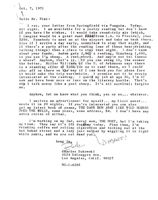 Charles Bukowski’s 1971 Letter Outlines Terms for Poetry Reading
Charles Bukowski’s 1971 Letter Outlines Terms for Poetry Reading
Envoi: Editor’s Notes
New Home
Thanks to an invitation from Kwame Dawes, editor-in-chief of Prairie Schooner, this edition of Poetry News in Review marks the first issue coming from its new home at the Prairie Schooner website. For those of you who are familiar with the newsletter, the only substantive change you will notice will be the initial prompt. If you are reading this, you have already encountered all the changes there are. For those of you new to Poetry News in Review, PNiR is a weekly compendium of news items gathered from newsfeeds and websites around the world, which the editor (yours truly) feels might be of interest to those with a penchant for all things poetic. While not comprehensive, it is meant, at least, to be eclectic. I invite you to check the Prairie Schooner website on a weekly basis or, if you prefer, go to the Poetry News in Review website [http://poetrynewsinreview.com/] and subscribe to PNiR for free to receive an automatic notice when new issues go live. I am thrilled to be associated with such a fine publication, and I hope that readers of Prairie Schooner find Poetry News in Review to be an informative, entertaining, and valuable addition to the journal. Enjoy!
—David Sanders